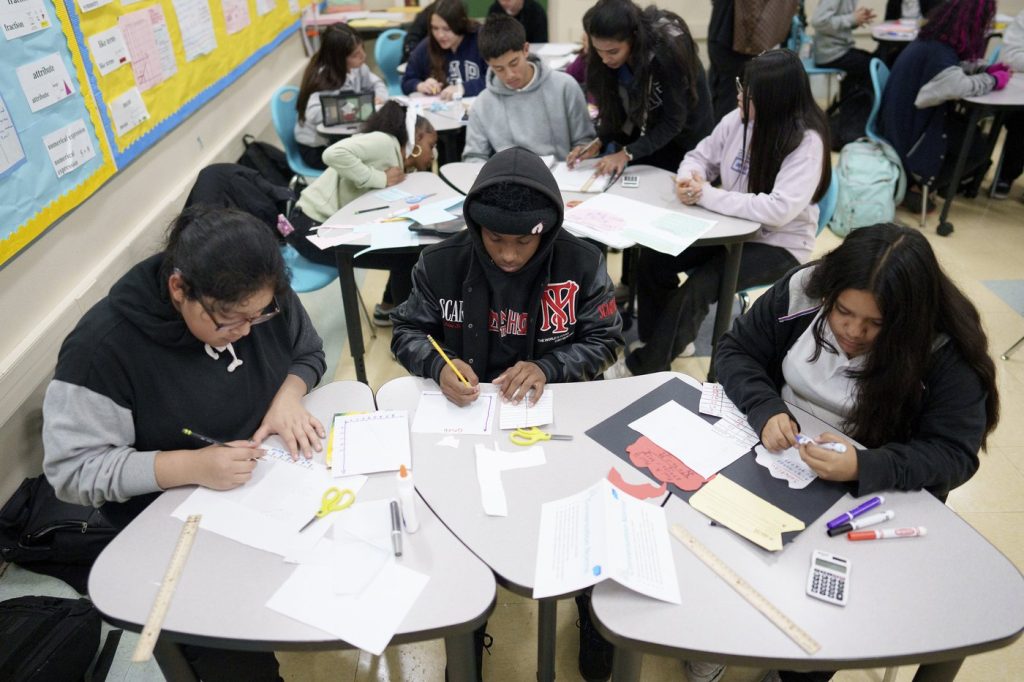Education
U.S. High School Students Experience Decline in Math and Reading Skills

In a concerning trend for American education, high school students have seen a significant decline in their reading and math skills, with scores reaching their lowest levels in over 20 years. According to results released on March 12, 2024, from the National Assessment of Education Progress (NAEP), this decline has persisted throughout the COVID-19 pandemic. The assessments reflect a troubling downward trajectory in academic performance that has been evident for more than a decade.
The latest data reveals that 12th graders scored lower than any previous cohort since NAEP began tracking these metrics. In reading, the average score in 2024 was the lowest recorded since assessments began in 1992. Alarmingly, 32% of high school seniors scored below the “basic” level in reading, indicating an inability to extract essential details from texts. In mathematics, 45% of seniors fell below the basic achievement threshold, marking the highest proportion since 2005. Only 33% of students were deemed academically prepared for college-level math, a drop from 37%Longstanding Trends and Pandemic Effects
Matthew Soldner, acting commissioner of the National Center for Education Statistics, emphasized the historical nature of these scores. “Scores for our lowest-performing students are at historic lows,” he stated. Soldner called for a collective effort to enhance student learning, highlighting that while the pandemic severely impacted education, the downward trend predates COVID-19. Experts attribute the decline to a combination of factors, including increased screen time, shorter attention spans, and a reduction in exposure to longer, complex texts. Carol Jago, associate director of the California Reading and Literature Project at UCLA, noted that changes in curriculum have shifted focus toward shorter texts and excerpts. As a high school English teacher two decades ago, Jago’s students read an average of 20 books annually, whereas some current classes assign as few as three books per year. “To be a good reader, you have to have the stamina to stay on the page, even when the going gets tough,” Jago explained, stressing the importance of building reading skills over time. Additionally, the latest NAEP results reveal widening achievement gaps among students. Lesley Muldoon, executive director of the National Assessment Governing Board, pointed out that the disparity between the highest- and lowest-performing students in eighth-grade science is the largest recorded. This trend reflects growing inequality in the U.S. education system. The scores also indicate a re-emergence of a gender gap in science, technology, engineering, and mathematics (STEM) fields. In 2019, boys and girls performed similarly on the NAEP science assessment, but by 2024, girls experienced a more pronounced decline in scores. This trend is echoed in state-level math assessments, suggesting that special programs aimed at engaging girls have diminished since the pandemic. Christine Cunningham, senior vice president of STEM learning at the Museum of Science in Boston, noted that students’ hands-on learning experiences were disrupted during the pandemic. “We don’t know exactly what the cause of it is, but it would be incomplete to assume that if we hadn’t had COVID, the score would not have gone down,” she said. Education Secretary Linda McMahon responded to the findings by underscoring the need for reform in educational funding. “Despite spending billions annually on numerous K-12 programs, the achievement gap is widening, and more high school seniors are performing below the basic benchmark in math and reading than ever before,” McMahon stated. As the educational landscape continues to evolve, these results serve as a critical reminder of the challenges facing American students. The ongoing decline in foundational academic skills poses significant implications for future generations, necessitating immediate and focused actions to reverse these trends.Widening Achievement Gaps
-

 Education2 months ago
Education2 months agoBrandon University’s Failed $5 Million Project Sparks Oversight Review
-

 Lifestyle3 months ago
Lifestyle3 months agoWinnipeg Celebrates Culinary Creativity During Le Burger Week 2025
-

 Science3 months ago
Science3 months agoMicrosoft Confirms U.S. Law Overrules Canadian Data Sovereignty
-

 Health3 months ago
Health3 months agoMontreal’s Groupe Marcelle Leads Canadian Cosmetic Industry Growth
-

 Science3 months ago
Science3 months agoTech Innovator Amandipp Singh Transforms Hiring for Disabled
-

 Technology3 months ago
Technology3 months agoDragon Ball: Sparking! Zero Launching on Switch and Switch 2 This November
-

 Education3 months ago
Education3 months agoRed River College Launches New Programs to Address Industry Needs
-

 Technology3 months ago
Technology3 months agoGoogle Pixel 10 Pro Fold Specs Unveiled Ahead of Launch
-

 Technology1 month ago
Technology1 month agoDiscord Faces Serious Security Breach Affecting Millions
-

 Business2 months ago
Business2 months agoRocket Lab Reports Strong Q2 2025 Revenue Growth and Future Plans
-

 Science3 months ago
Science3 months agoChina’s Wukong Spacesuit Sets New Standard for AI in Space
-

 Education3 months ago
Education3 months agoAlberta Teachers’ Strike: Potential Impacts on Students and Families
-

 Technology3 months ago
Technology3 months agoWorld of Warcraft Players Buzz Over 19-Quest Bee Challenge
-

 Business3 months ago
Business3 months agoNew Estimates Reveal ChatGPT-5 Energy Use Could Soar
-

 Education3 months ago
Education3 months agoNew SĆIȺNEW̱ SṮEȽIṮḴEȽ Elementary Opens in Langford for 2025/2026 Year
-

 Business3 months ago
Business3 months agoDawson City Residents Rally Around Buy Canadian Movement
-

 Technology1 month ago
Technology1 month agoHuawei MatePad 12X Redefines Tablet Experience for Professionals
-

 Technology3 months ago
Technology3 months agoFuture Entertainment Launches DDoD with Gameplay Trailer Showcase
-

 Business3 months ago
Business3 months agoBNA Brewing to Open New Bowling Alley in Downtown Penticton
-

 Technology3 months ago
Technology3 months agoGlobal Launch of Ragnarok M: Classic Set for September 3, 2025
-

 Technology3 months ago
Technology3 months agoInnovative 140W GaN Travel Adapter Combines Power and Convenience
-

 Science3 months ago
Science3 months agoXi Labs Innovates with New AI Operating System Set for 2025 Launch
-

 Technology3 months ago
Technology3 months agoNew IDR01 Smart Ring Offers Advanced Sports Tracking for $169
-

 Technology3 months ago
Technology3 months agoDiscover the Relaxing Charm of Tiny Bookshop: A Cozy Gaming Escape










